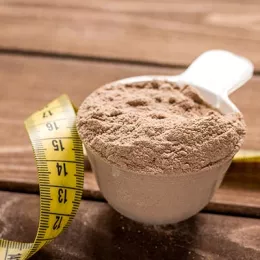Can taking magnesium prevent muscle cramps?

Lindsay Moyer - CSPI.
“Muscle cramps—in the legs, feet, hands, and everywhere else—are often caused by a severe magnesium deficiency,” says Cramp Defense, a supplement that has 70 milligrams of magnesium per capsule.
“Since magnesium is constantly lost, take Cramp Defense every day to build up and maintain an optimal magnesium supply,” it says.
Can magnesium really help?
Does magnesium work, especially for the cramps that often strike older people in bed? Scott Garrison, associate professor of family medicine at the University of Alberta in Canada, may be the best person to ask.
“When I was a family physician, I had a patient who was in hospital being treated for pneumonia, and she was magnesium deficient so we gave her a series of infusions of magnesium,” says Garrison.
“And when she came back for follow-up, she mentioned that these horrible cramps that she’d had for years were gone.”
That patient led Garrison to switch from family doctor to researcher.
“I knew that magnesium was being widely marketed for muscle cramps and that magnesium is very poorly orally absorbed,” he explains. “Much of it stays in the bowel and pulls water with it. That’s why Milk of Magnesia is a laxative.”
Does magnesium work for muscle cramps?
Garrison randomly assigned 46 people with nighttime muscle cramps to get intravenous infusions of magnesium or a placebo. “We knew that was the most effective way to give magnesium,” he says.
It didn’t matter. “Even in people who were deficient, magnesium didn’t make a difference.”
Since then, Garrison has twice examined all of the trials on magnesium and cramps. The studies came up empty. “Magnesium doesn’t reduce the frequency or severity of nocturnal leg cramps in older adults.”
“We couldn’t draw any conclusions about cramps in pregnant women, in people with certain neurological disorders, or when people cramp during exercise, usually at the extremes of exertion,” he adds.
So what causes nighttime cramps? “We don’t know,” says Garrison. “But we do know that it’s a nerve disorder, not a muscle disorder.”
“The nerve that sits in the base of your spine and projects all the way down to the muscle it innervates, that nerve is responsible for the cramping,” he explains.
What might—and what probably won’t—help with cramps?
Switching meds may help
Leg cramps can be a side effect of many prescription drugs (though cramps also occur in plenty of people who take none).
“In my own research, two commonly used medications—potassium-sparing diuretics like spironolactone and inhaled beta-agonists like salmeterol—appear to promote cramps,” says Garrison. “People use beta-agonist inhalers to open their airways when they have COPD, emphysema, or asthma.”
Garrison’s study didn’t prove that the drugs cause cramps, he cautions. Still, it’s worth talking to your doctor about the pros and cons of trying another drug. (Don’t just stop taking your meds.)
Switching may be easy.
“Inhalers like Spiriva or Atrovent work in a different way and have no link to cramping,” notes Garrison. “And there are lots of alternative blood pressure pills.”
Stretching before bed may not help
“Two randomized trials of prophylactic stretching before you go to bed had different results,” says Garrison.
“The study that suggests a benefit compared stretching to no treatment. That makes it less believable than the second study, which compared stretching to movements that were not stretches. And that study showed no benefit.”
Try stretching a cramped muscle to stop a cramp
“If you stretch the muscle while it’s cramping, it may help stop the cramp,” says Garrison. “It’s done around the world by sports trainers when people have a cramp, and studies have found that it’s harder to ignite a cramp when the muscle is at its most-stretched position.”
Got a calf muscle cramp? “Stand up and try to lean forward so that the muscle is lengthening,” says Garrison.
Why you shouldn't try quinine
Taking the anti-malaria drug may reduce cramps by about 30 percent, according to some estimates, but that’s based on low-quality evidence.
Worse yet, “quinine can attack your platelets, so you’re at risk for bleeding,” cautions Garrison. “It can also cause heart rhythm disturbances.”
That’s why the Food and Drug Administration warns doctors not to prescribe quinine for cramps.
Don’t worry about getting too much quinine from tonic water, though. “You’d need at least nine cans to get the quinine in one tablet,” says Garrison.
The bottom line
Don’t rely on magnesium, quinine, or stretching before bed to prevent cramps. Switching meds may help. Stretching can ease a cramp once it starts.
Support CSPI today
As a nonprofit organization that takes no donations from industry or government, CSPI relies on the support of donors to continue our work in securing a safe, nutritious, and transparent food system. Every donation—no matter how small—helps CSPI continue improving food access, removing harmful additives, strengthening food safety, conducting and reviewing research, and reforming food labeling.
Please support CSPI today, and consider contributing monthly. Thank you.

Calendar
Good Foods 2023
Every gorgeous photo in the Good Foods 2023 calendar will whet your appetite for delicious, healthy food. And the simple recipe below each photo, from Healthy Cook Kate Sherwood, will help you turn that month’s star into the star of your dinner table.




